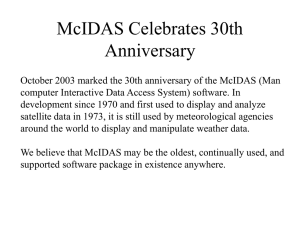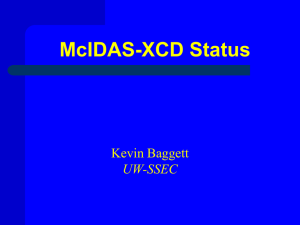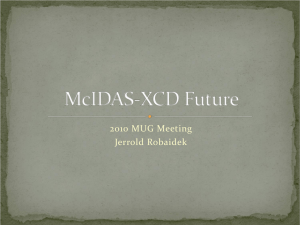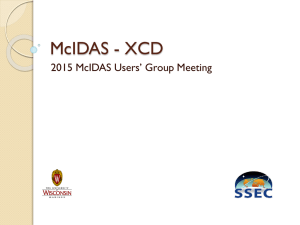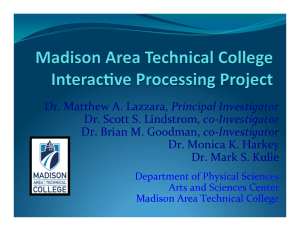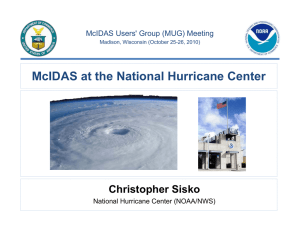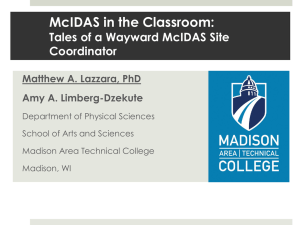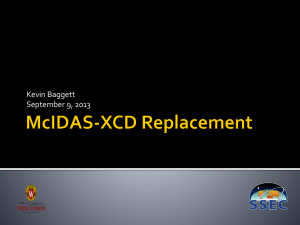2010 MUG Meeting Jerrold Robaidek
advertisement
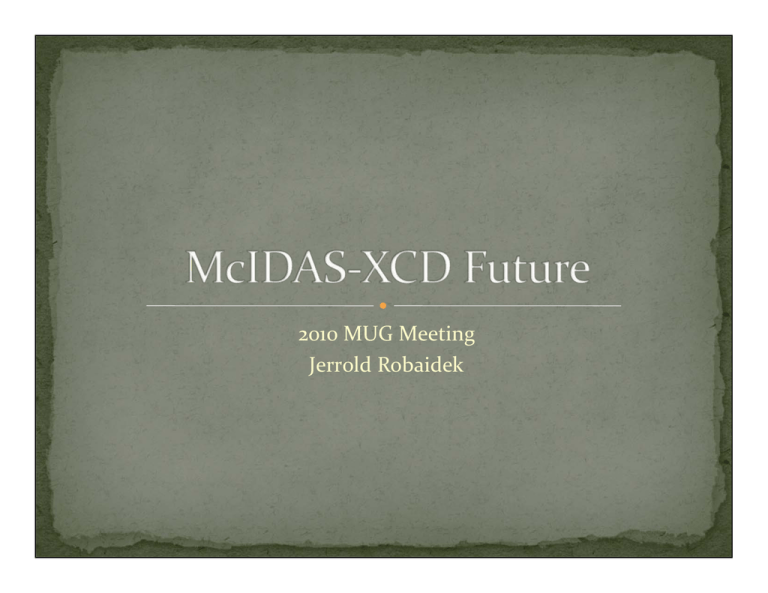
2010 MUG Meeting Jerrold Robaidek McIDAS‐XCD McIDAS X Conventional data Decoder McIDAS‐XCD files, decodes and indexes the NOAAPORT data stream (or other data streams) into formats that can be served by McIDAS‐X ADDE servers. Output formats include McIDAS MD files, text files, McIDAS GRID files, GRIB and GRIB2 files, NEXRAD files, and GINI files. y Before 1994, conventional data was decoded on IBM y y y y mainframe (Whittaker) Early 1990s moved to a distributed system. Prototypes developed for McIDAS‐OS2 (PC McIDAS) Called McIDAS‐OCD (Pyeatt) 1994 first version on Unix. Required McIDAS‐X. Named McIDAS‐XCD (Pyeatt) Data came in on a Central Data Card via the Family of Services. NOAAPORT certified operational on November 25, 1998 data broadcast over L‐Band ingested by SSEC SDI y GOES Channel y y y *NCEP/NWSTG Channel (NWS Telecommunications Gateway) y y y y y model output from the National Centers for Environmental Prediction (NCEP) observations, forecasts, watches and warnings produced by NWS Forecast Offices WSR‐88D radar products most observational data over North America. *NCEP/NWSTG2 Channel y y GOES East visible, infrared, and water vapor for the Eastern Conterminous United States (CONUS), Puerto Rico, supernational composites, and Northern Hemisphere (NH) composites GOES West. visible, infrared, water vapor for CONUS, Alaska, and Hawaii; supernational composites, and NH composites. supplements the NWSTG channel. Non‐GOES Imagery/DCP Data Channel y y y GOES DCP data MTSAT/GOES‐West/GOES‐East/METEOSAT‐7/METOSAT‐9 composites for visible, IR, and water vapor products (every 3 hours) OCONUS grids. TDWR RADAR products added Model GRIB volume steadily No significant increasing volume increases 2003‐2005 Introduction of NEXRAD Mostly text, point (operational some Grids 170 MB January 1, 2001) in 1998 – 300 MB in 2000 NOAAPORT Operational 1.6 Mb/s (11/25/1998) NOAAPORT DVB‐S begins 10.24 Mb/s (1/2005) NOAAPORT DVB‐S2 begins 30 Mb/s (March‐ April 2011) Currently we get NOAAPORT data in two ways 1. Directly from DOMSAT via DBS using NOVRA S75 2. Over the Internet via LDM Internet Internet LDM y Filing and indexing text data y Filing and indexing point/MDXX y Data management for NEXRAD y Can incorporate local data feeds y Installation/upgrades are difficult (many steps, prone to user error) y System is complex, large learning curve for operators, and very large learning curve for new programmer y Performance can be an issue y Data stored in format different than incoming format y Can’t handle BUFR (except for filing) y McIDAS‐XCD Survey (sent out immediately following this meeting) y y y Find out what users like/don’t like Find out what parts of McIDAS‐XCD are used Solicit input on the future directions y Does McIDAS‐XCD need to change? y If yes, how? y y y y Stand alone decoders? LDM decoders? ADDE servers? Other server model? THREDDS? RAMADDA?
